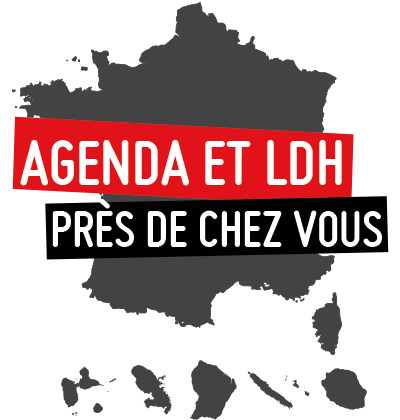Communiqué commun dont la LDH est signataire
Télécharger le communiqué en PDF
For two years, Kashmiri human rights defender Khurram Parvez has endured arbitrary detention in Rohini jail, India. Human rights organisations, including the International Federation for Human Rights (FIDH) and the World Organisation Against Torture (OMCT), within the framework of the Observatory for the Protection of Human Rights Defenders, condemn the politically motivated charges under the Unlawful Activities Prevention Act (UAPA), as they constitute a violation of international human rights standards. We call for his immediate release as well as that of the journalist Irfan Mehraj.
We, the undersigned organisations, call for the immediate and unconditional release of human rights defenders Khurram Parvez and Irfan Mehraj, who are currently being detained in Rohini jail in India. Khurram has been in pre-trial detention for two years now, on politically motivated charges under the Unlawful Activities Prevention Act (UAPA), an Indian counter-terror law that violates international human rights standards.
Irfan has been in pre-trial detention since March 2023, similarly on politically motivated charges. Indian authorities’ persecution of Khurram and Irfan is an emblematic part of their ongoing, systematic criminalization of civil society, and the defense of human rights, in Indian-administered Kashmir.
Khurram is the Coordinator of Jammu Kashmir Coalition of Civil Society (JKCCS) and presently the Deputy Secretary-General of the International Federation for Human Rights (FIDH). He has, for years, documented human rights violations in Indian-administered Kashmir, including enforced disappearances and unlawful killings. He was awarded the 2022 Martin Ennals Award for his tireless human rights work.
His outstanding human rights work has been met with Indian authorities’ unrelenting repression. Khurram was arrested on 22 November 2021 by the National Investigation Agency (NIA), India’s counter-terrorism agency, on various trumped-up charges including “waging, or attempting to wage war, or abetting waging of war, against the Government of India,” “punishment for conspiracy to wage war against the Government of India,” “raising funds for terror activities,” “punishment for conspiracy,” and other provisions of the UAPA and the Indian Penal Code. He was arrested after raids and seizures conducted at his office and home by the NIA on 21 November 2021.
In March 2023, Khurram was arrested again in another case registered in 2020 by the Indian authorities on fabricated charges of “terror financing” along with independent journalist Irfan Mehraj, who was formerly associated with JKCCS. The NIA filed a charge-sheet against Khurram and Irfan in this case on 15 September 2023.
Khurram had previously faced targeted reprisals from the Indian authorities for defending human rights in Kashmir. In September 2016, he was prevented from travelling to Switzerland to attend the United Nations (UN) Human Rights Council and later was arrested under the Jammu & Kashmir Public Safety Act and arbitrarily detained in prison for 76 days.
The UAPA, has been increasingly abused by Indian authorities to bring politically motivated charges against human rights defenders. UN experts in May 2020 expressed their concerns about various provisions of the UAPA and its non-conformity with international human rights laws and standards. The experts noted that provisions in the UAPA such as the powers to detain a person for up to 180 days “without providing any evidence” were particularly problematic and highlighted Section 43 D (5) of the UAPA, which makes it “highly unlikely” for a person arrested under this law to be released on bail.
On 31 October 2023, UN experts again raised concerns about the UAPA, stating that the pre-trial detention period of 180 days, which can subsequently be increased, is beyond reasonable and called for a review of the UAPA in line with international human rights standards and with recommendations made by the Financial Action Task Force (FATF).
The UN Working Group on Arbitrary Detention (WGAD) in its opinion published in June 2023, said that Khurram’s detention was “arbitrary” and called on the Indian authorities to immediately release him.
The reprisals and judicial harassment against Khurram are occurring within a larger context of systematic, longstanding, grave human rights violations by Indian authorities in Indian-administered Kashmir and impunity for those violations. Since the abrogation of Article 370 of the Indian Constitution in August 2019, Indian authorities have forcibly closed the already highly restricted civic space in the region. Journalists continue to face targeted harassment including arrests, travel bans, and passport suspensions for their reporting. Access to information is severely restricted through arbitrary internet shutdowns.
Our organisations call on the Indian authorities to immediately and unconditionally release Khurram Parvez and Irfan Mehraj, to drop all charges against them, and to end all kind of harassment against all Kashmiri human rights defenders and civil society organisations. India must also amend the UAPA to bring it in conformity with international human rights laws and standards, end the criminalisation of human rights defenders and journalists; and ensure accountability for human rights violations committed by Indian forces in Indian-administered Kashmir.
We also call upon the Indian authorities to immediately comply with their international legal obligations, by allowing civil society to freely operate in Indian-administered Kashmir and India, and by ceasing their longstanding obstruction of international civil society and inter-governmental organisations, including the UN Special Rapporteurs and other human rights mechanisms which should have unfettered access to Indian-administered Kashmir and Kashmiri detainees.
Paris, le 21 novembre 2023.


